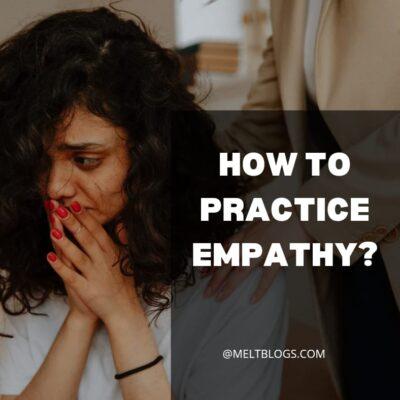How to practice empathy: Generally, highly empathetic people are likely to have more meaningful relationships and friends. On the other hand, a person with a low empathizing personality is associated with personality disorders like a narcissistic personality disorder or antisocial personality disorder.
While being more empathetic might seem hard, it is possible with practice over time. (How to practice empathy?)
What Is Empathy?
Empathy is feeling someone else’s incident so much that you can feel their experience yourself. It is the basis for understanding and kindness. It helps us to understand the experiences, feelings, and needs of the other person.
It is separate from sympathy, as sympathy is simply focused on responding to the experiences. Empathy is one step above being able to put yourself in another person’s shoes.
Also Read: How to boost mental health?
There are two types of empathy:
- Emotional empathy. As you might understand from its name, emotional empathy means being able to feel the same emotion as the other person. The second element of emotional empathy is feeling grief at their misfortune, while the third element is feeling empathy for them.
- Cognitive empathy. This is how you can sense and understand the way someone feels. This is like a skill of emotional empathy and takes time to develop. Cognitive empathy involves time to learn how to recognize specific feelings and behaviors.
How Do We Feel Empathy?
Many neuroscientists believe that empathy is simply the process of forging the exact emotion in ourselves that we see in other people. It is called the Simulation Theory.
However, initial proof suggests that we have specialized neurons in our brains called “mirror neurons” that get triggered when we feel and see emotions. Many scientists believe that empathy is developed with these mirror neurons.
Other scientists believe that empathy is created simply through intelligence. The idea is that we experience empathy by noticing others and experience intellectually how we should feel or react to someone else’s feelings.
How to practice empathy:
Become curious about people
Empathetic people stay curious about the people around them. They may hit up conversations with strangers or monitor others with openness. They are people with a natural curiosity that we all have when we are children. This curiousness helps us empathize because it discloses different worlds, lifestyles, and people we would not usually meet.
Focus on alikeness rather than differences
Every single one of us has preferences. There are ways to put other people into boxes and create beliefs about them based on stereotypes. Doing this to others keeps us from comprehending other people’s individuality and special qualities. This can help us to better understand them.
Imagine yourself in others’ situations
Engaging yourself in the life and incidents of others is a great way to increase your empathy.
Empathy is just being empathetic to others but, it is also about showing our true selves to others. Relying on someone with your honest thoughts and feelings is essential in building a nourishing and empathetic relationship with someone else.
Get creative with it
Some people think that just because someone differs from them or if the other person has a distinct lifestyle than that person doesn’t deserve empathy. Using your vision and imagination is necessary when empathy appears hard or even impossible.



